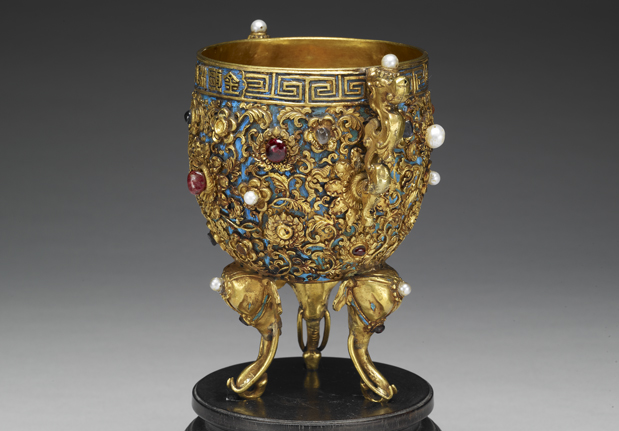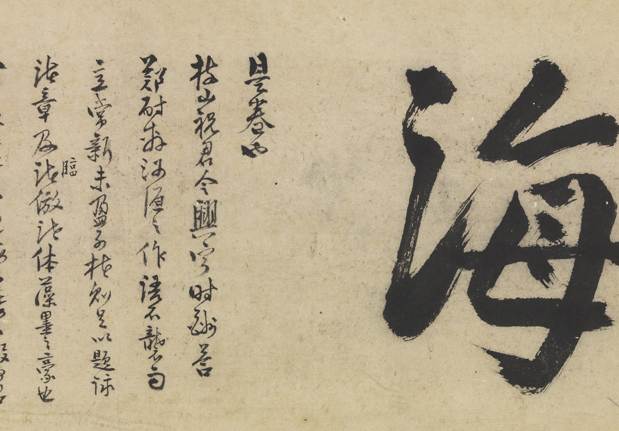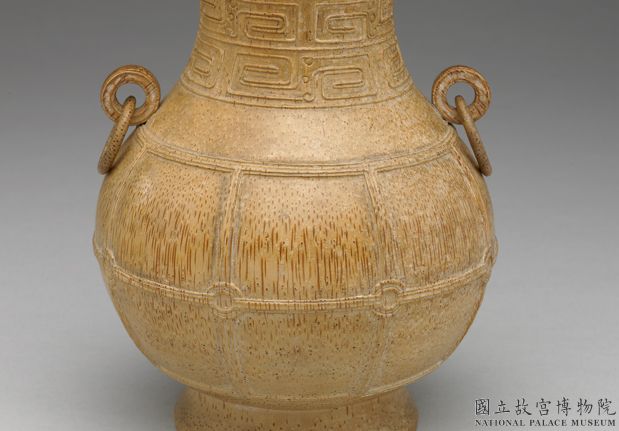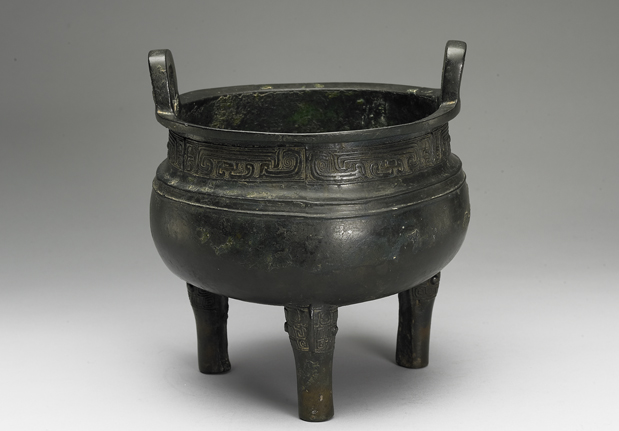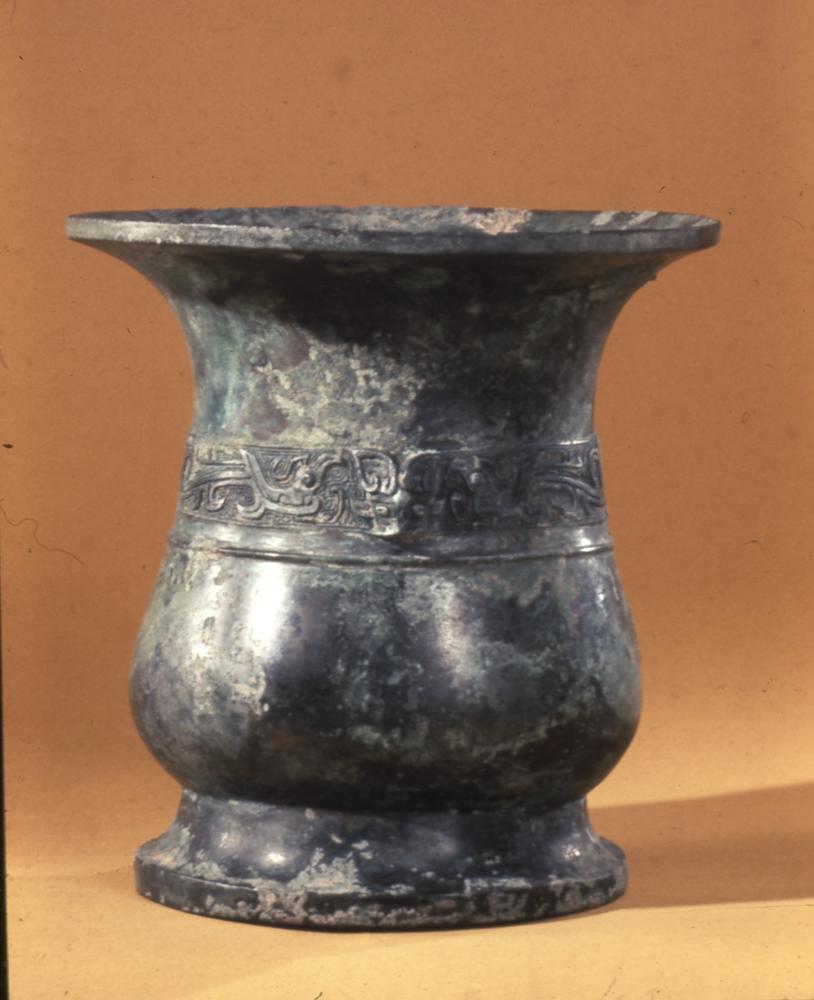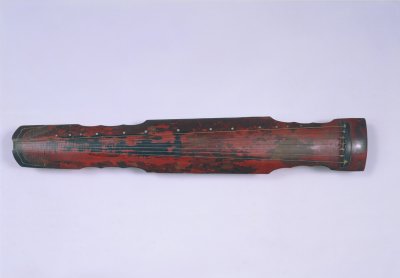Period:Tang dynasty Production date:9thC-10thC
Materials:silk, 絲綢 (Chinese),
Technique:gauze, 紗 (Chinese),
Dimensions:Length: 8.60 centimetres Width: 8 centimetres
Description:
The pattern woven silk gauze in purple has a design of dotted chevron bands with a double line along one edge, separated by a band of symbols. These comprise a lozenge shape quartered into four individual diamond shapes, each containing two lines crossing diagonally, alternating with an outlined swastika. On the other side of the band, there are the remains of a floral motif. The pattern repeat is 16 cm in both the warp and the weft direction. One of the fragments have a selvedge of 0.9 cm intact. The swastika motif is very old and is found in Neolithic cultures in both Iran and Europe, and later in many different cultures world-wide. In particular, the swastika became a sacred symbol in Hinduism, Buddhism and Jainism. Some sources indicate that it was used as an alternative symbol of the sun during the Tang dynasty. However, its plain geometrical design made it particularly suitable for weaving. It is also a simple symbol for a repeating design. Technically, the ground is woven symmetrically with a crossing warp and a fixed warp, but the pattern is made by the floating of the crossing warp. This weave could be categorised as a type of simple gauze, which appeared in the late Tang period. As a tribute textile produced in Sichuan province, it was described in Wang Jian’s poem Zhi jin qu written in the late Tang dynasty. Weave structures: Warp: silk, untwisted, normally single, but occasionally paired, purple, 26 ends/cm; Weft: silk, untwisted, normally triple, purple, 13 lats/cm; Weave structure: ground: 1:1 doup warp crossing fixed warp symmetrically; pattern: floating of doup warp on fixed warp. 暗花紗殘片,其中正方形的一塊帶有寬爲0.9cm的幅邊。從技術上看,這種紗的地部由絞經和地經對稱絞織而成,其花部則由絞經經浮産生,屬於簡單紗羅一類。簡單紗羅自唐代晚期九世紀開始出現,當時稱爲“單絲羅”,是四川一帶的貢品。晚唐詩人王建《織錦詞》中寫道:“錦江轉涸貢轉多,宮中盡著單絲羅”,正是說明單絲羅産自四川並作爲貢品。同樣的織物還有不少殘片保存在V&A博物館中(LOAN:STEIN.224和645),從而可以將圖案基本復原。其圖案中心是一個聯珠方格,方格之間是一些田字紋和卍字紋。圖案循環經緯向均約爲16cm。 組織結構: 經線:絲,無撚,通常單根排列,偶然成雙排列,紫色,26根/cm;緯線:絲, 無撚,通常三根排列,紫色,13根/cm;組織:地部,1:1 對稱絞轉;紋部:絞經浮於地經之上。
IMG
![图片[1]-textile; 紡織品(Chinese) BM-MAS.901.b-China Archive](https://chinaarchive.net/Tang dynasty/43/mid_00009985_003.jpg)
![图片[2]-textile; 紡織品(Chinese) BM-MAS.901.b-China Archive](https://chinaarchive.net/Tang dynasty/43/mid_00154213_001.jpg)
![图片[3]-textile; 紡織品(Chinese) BM-MAS.901.b-China Archive](https://chinaarchive.net/Tang dynasty/43/00154214_001.jpg)
Comments:This fragment belongs to the same textile of MAS.901.a.
Materials:silk, 絲綢 (Chinese),
Technique:gauze, 紗 (Chinese),
Dimensions:Length: 8.60 centimetres Width: 8 centimetres
Description:
The pattern woven silk gauze in purple has a design of dotted chevron bands with a double line along one edge, separated by a band of symbols. These comprise a lozenge shape quartered into four individual diamond shapes, each containing two lines crossing diagonally, alternating with an outlined swastika. On the other side of the band, there are the remains of a floral motif. The pattern repeat is 16 cm in both the warp and the weft direction. One of the fragments have a selvedge of 0.9 cm intact. The swastika motif is very old and is found in Neolithic cultures in both Iran and Europe, and later in many different cultures world-wide. In particular, the swastika became a sacred symbol in Hinduism, Buddhism and Jainism. Some sources indicate that it was used as an alternative symbol of the sun during the Tang dynasty. However, its plain geometrical design made it particularly suitable for weaving. It is also a simple symbol for a repeating design. Technically, the ground is woven symmetrically with a crossing warp and a fixed warp, but the pattern is made by the floating of the crossing warp. This weave could be categorised as a type of simple gauze, which appeared in the late Tang period. As a tribute textile produced in Sichuan province, it was described in Wang Jian’s poem Zhi jin qu written in the late Tang dynasty. Weave structures: Warp: silk, untwisted, normally single, but occasionally paired, purple, 26 ends/cm; Weft: silk, untwisted, normally triple, purple, 13 lats/cm; Weave structure: ground: 1:1 doup warp crossing fixed warp symmetrically; pattern: floating of doup warp on fixed warp. 暗花紗殘片,其中正方形的一塊帶有寬爲0.9cm的幅邊。從技術上看,這種紗的地部由絞經和地經對稱絞織而成,其花部則由絞經經浮産生,屬於簡單紗羅一類。簡單紗羅自唐代晚期九世紀開始出現,當時稱爲“單絲羅”,是四川一帶的貢品。晚唐詩人王建《織錦詞》中寫道:“錦江轉涸貢轉多,宮中盡著單絲羅”,正是說明單絲羅産自四川並作爲貢品。同樣的織物還有不少殘片保存在V&A博物館中(LOAN:STEIN.224和645),從而可以將圖案基本復原。其圖案中心是一個聯珠方格,方格之間是一些田字紋和卍字紋。圖案循環經緯向均約爲16cm。 組織結構: 經線:絲,無撚,通常單根排列,偶然成雙排列,紫色,26根/cm;緯線:絲, 無撚,通常三根排列,紫色,13根/cm;組織:地部,1:1 對稱絞轉;紋部:絞經浮於地經之上。
IMG
![图片[1]-textile; 紡織品(Chinese) BM-MAS.901.b-China Archive](https://chinaarchive.net/Tang dynasty/43/mid_00009985_003.jpg)
![图片[2]-textile; 紡織品(Chinese) BM-MAS.901.b-China Archive](https://chinaarchive.net/Tang dynasty/43/mid_00154213_001.jpg)
![图片[3]-textile; 紡織品(Chinese) BM-MAS.901.b-China Archive](https://chinaarchive.net/Tang dynasty/43/00154214_001.jpg)
Comments:This fragment belongs to the same textile of MAS.901.a.
© Copyright
The copyright of the article belongs to the author, please keep the original link for reprinting.
THE END
